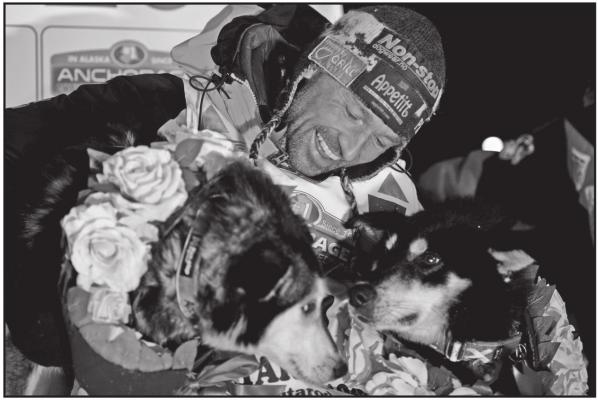Waerner wins Iditarod race
ANCHORAGE, Alaska (AP) — Norwegian musher Thomas Waerner easily won the Iditarod Trail Sled Dog Race across Alaska, one of the few U.S. sporting events not canceled by concerns over the new coronavirus.
Waerner crossed the finish line in Nome, Alaska, early Wednesday morning.
“This is awesome,” he told reporters at the finish line. “This is something special.”
It took him 9 days, 10 hours, 37 minutes and 47 seconds to travel nearly 1,000 miles (1,609 kilometers) across Alaska.
Waerner immediately thanked the 10 dogs in harness, petting and rubbing each, ending his with lead dogs, K2 and Bark. Then each dog got a snack.
Bark, he said, is the tough one. “He’s the one just charging through everything. It doesn’t matter what comes, he will just go through it, storms or whatever. So they two together are an amazing team.”
Fans didn’t employ social distancing as they poured out of bars and hotels to cheer Waerner as he drove the team off the Bering Sea ice and down Front Street to the finish line under the famed burled arch.
He will earn a minimum of $50,000 and a new pickup truck for winning the race. The actual cash amount will depend on how many mushers finish the race, a factor in how the prize money is divvied out.
The 47-year-old musher won the Iditarod in only his second attempt. He finished 17th in 2015, when he was named Rookie of the Year.
Waerner took command of this year’s race in the late stages and steadily built an insurmountable lead. The closest musher to Waerner was three-time champion Mitch Seavey, who was about five hours behind.
Wearner becomes the third Norwegian to win the Iditarod. Joar Leifseth Ulsom won the 2018 race and Robert Sorlie twice won the Iditarod, in 2003 and 2005.
Wearner, who lives in Torpa, Norway, won the 745-mile (1,200-kilometer) Finnmarkslopet, the longest sled dog race in Europe, in 2019.
The Iditarod began March 8 just north of Anchorage for 57 mushers, the second smallest field in two decades. They crossed two mountain ranges and mushed on the frozen Yukon River before reaching the Bering Sea. Since the race started, 11 mushers have withdrawn from the race.

